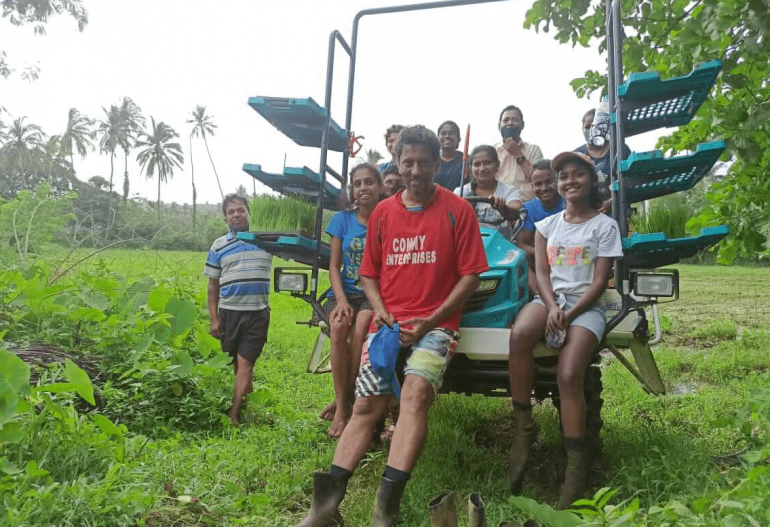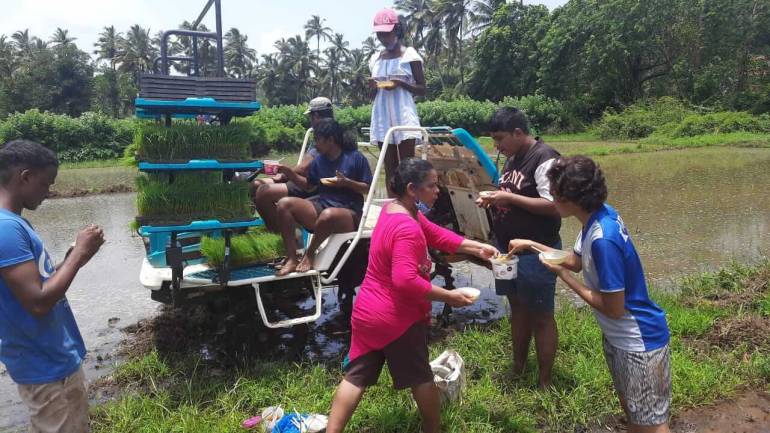Indian priest inspires youth to be self-reliant on agriculture

A priest in India’s western state of Goa motivates youth to become self-reliant on agriculture.
Directing youth to agriculture is leading them to “self-reliance,” says Father Bolmax Fidelis Pereira, the parish priest of St Xavier Church in Goa’s Chicalim.
Referring to Prime Minister of India Narendra Modi’s suggestion to “Atmanirbhar” (self-reliant), Fr Pereira said, “I am thinking of Atmanirbhar and revival of Agriculture.”
And he found the involvement of youth in the fields would meet this goal.
“The Covid-19 lockdown in 2020 forced the migrant labourers to return to their native villages leaving Goa, and the farmers in Goa were left in a dilemma. The cultivation had not yet been done. The youth responded to my invitation, and they helped in cultivating the paddy and later for harvesting it too,” Fr Pereira said with a twinkle in his eyes.
Some youth who participated in the cultivation had a farming background. For others, it was a learning process. However, their timely help was a relief for the farmers.
Stefanie Lucas, the field coordinator who is also a Panchayat (village council) member, Chicalim says she enjoys the work.
“Now we have planted paddy. After harvesting it, we will plant vegetables. Earlier, I did not like to go to the fields, especially during the rainy season. But now I find it a great experience. We share the profit, and it goes to our club,” she said.
The Chicalim Youth Farmers’ Club has about 70 members between the ages of 15-35. After the initiation into farming, they approached some farmers to cultivate the fallow land left uncultivated for many years.
“They supported our plan to revive the fields if the youth were ready to work with them,” Fr Pereira explained.
Thus, Chicalim Youth Farmers Club is from various religious groups.
As they wait for the harvest, Fr Pereira explained, “The primary goal is the revival of fallow lands in Chicalim and the secondary goal is to present agriculture as a viable economic industry.”

According to the priest, the land is fertile and holds a great scope for farming and agricultural activities.
“The pandemic has taught us to be self-sufficient as far as agricultural products are concerned. Our young people are willing to return to agriculture, which was once the backbone of our Goan economy. This coupled with government schemes for an agriculture boost surely promises a bright future for agricultural activities in Goa,” the priest says.
This will get the Goan community back to its roots, where their identity and security lies.
“Let us extract a lot of gold in our fields and backyards. The youth will get academically sound and agriculturally skilled. Then they need not leave their state for greener pastures anymore, as it is here itself. Let us uphold the dignity of the farmers. It is they who produce to feed our stomachs,” says Fr Pereira, currently an assistant professor of Botany at St. Joseph Vaz Science College, Cortalim.
Born at Quepem village, his interest in the environment and agriculture was inspired by his parents, who were farmers.
“It guided me to do Masters in Ecology and Environment from Sikkim-Manipal University,” he says.
He finished his doctorate in Botany from Jodhpur National University in 2017. His research involved studying the wetlands in Goa.
Radio Veritas Asia (RVA), a media platform of the Catholic Church, aims to share Christ. RVA started in 1969 as a continental Catholic radio station to serve Asian countries in their respective local language, thus earning the tag “the Voice of Asian Christianity.” Responding to the emerging context, RVA embraced media platforms to connect with the global Asian audience via its 21 language websites and various social media platforms.














